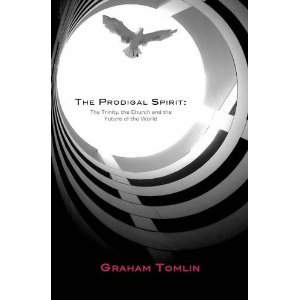The Holy Spirit and the Purpose of Life
Another excerpt from my recent book - The Prodigal Spirit - The Spirit and human vocation- Buy here
The Spirit unites us with Christ, so that we can know the love of the Father for the Son, as a love into which we are drawn. This also means that we find ourselves called into the mission of the Son towards the world. Bring ‘in Christ’ by the Spirit means becoming caught up in his work to prepare for the new creation. Our new identity leads to a new vocation, to join with God in his work of ‘bringing all things together under Christ’, ‘looking forward to a new heaven and a new earth’.
The Spirit does not do his work in creation directly. Alongside the Spirit, humanity plays a distinct role in the creation stories in the development and maturing of creation. As human beings are created at the climax of creation, they are called to ‘work it, and take care of it’ (Gen. 2.15). Humanity is deeply involved in God’s work to bring creation to its fulfillment, though activities such as work, art, technology and the scientific enterprise of understanding, naming and harnessing the powers of the world. The Spirit of God is free to work without human agency (after all, flowers grow, birds sing and forests breathe without the help of people), yet to bring creation to its true fulfillment, the Spirit works through human agency. Humanity always had a purpose. It was to work with the Holy Spirit in caring for the created order, and enabling it to fulfill the latent potential in it. Parents cannot make a child mature. They can however help to shape the child as he grows, forming his mind, interests, values and future career. Gardeners cannot make plants grow. They can however tend the plant, pruning it and fertilizing the soil to make sure it grows straight and free from parasites. In the same way, humanity cannot bring or give life to the creation – only God the Holy Spirit does that. Yet we can, and are called to shape that creation as it develops, giving it form, order and structure.
However when we remember the work of the Spirit within a damaged, broken world, we see a further role for humanity. Our calling is not only to help creation grow to maturity, but also to be involved in its healing. Of course, humanity itself is affected by that brokenness. We were intended to be involved in the evolving growth of creation into maturity, yet we have become part of the problem, damaging and destroying the very creation we were meant to tend and care for. Every harsh word, broken relationship or polluted river is evidence that we are complicit in the destruction of creation, joining in the impulse to return creation to the chaos from which it came, co-operating with forces of death, not the Spirit who brings Life.The work of redemption requires forgiveness, cleansing, and a new creation, so that we can again take our place, working with, rather than against the Spirit in his work of bringing life and vitality to the world. The sending of the incarnate Son restores the image of God into humanity, and atones for the sins of the world. Paul puts it like this: “In Christ, God was reconciling the world to himself.” (2 Corinthians 5.19). God’s work of restoring the broken creation is focused in the coming of the divine Son into the world in the person of Jesus the Christ. If the Spirit is to work with us and through us to enable creation to reach its full potential, that means that humans will not only need to be ransomed and forgiven, they will also need to be filled with that same Spirit, so they can be agents of God’s work in the world. The Incarnation suggests that God’s normal way of working is not to use people like instruments, like a workman using a screwdriver or a gardener a spade. Jesus has his own will, which he chooses to bend to the Father’s will, as happens most tellingly in Gethsemane. God transforms from within, gradually changing desire and will, so that people choose to do his will, rather than being forced to. So, for us to be agents of the Spirit’s work of completing creation, we need to be filled with that same Spirit, not just mechanically used by him. We are filled with the Spirit so that he can work through us to complete his work in the world.
There is a sobering side to this too. A sense of the power of the Spirit, the overpowering sense of the love of God can end up with a one-sided triumphalism. However, being united with Christ does not just mean knowing the love of the Father, it also means being united with him ‘in his death’ (Romans 6.5). Romans 8, that seminal New Testamenr passage on the Spirit, contains that solemn note of suffering hidden within its theology of the Spirit:
The Spirit himself testifies with our spirit that we are God's children. Now if we are children, then we are heirs—heirs of God and co-heirs with Christ, if indeed we share in his sufferings in order that we may also share in his glory. (Romans 8.15-17)
If we are united with Christ through the Spirit, so that we experience for ourselves the intimate love of the Father for his Son, enabling us to call him ‘Abba’ as Jesus did, then this text reminds us that we are united with the crucified Son. Our fellowship with Christ is a fellowship of his sufferings (Philippians 3.10).




Beautifully written - I particularly liked thinking about God's Spirit working alongside us as with gardening or raising children. Thanks for posting!
ReplyDelete